#anti justinia v
Explore tagged Tumblr posts
Text
on divine justinia (pt 3)
Justinia V will be remembered as one of the most progressive Divines in the history of the Chantry. Before her untimely death at the Temple of Sacred Ashes, she made strides to break down barriers for both mages and elves, as well as encouraging free thought among the Maker’s many children. For her views, she won as many enemies as she did supporters.
-- World of Thedas Vol 2.
PART THREE of a series, exploring Divine Justinia’s political stance. Was she really as progressive as people claimed?
Firstly, before we even dive into looking at Justinia as a character, we should define ‘progressive’. In the most base of definitions, it implies progress -- a gradual betterment. As a widely accepted definition, someone whose politics advocate for social reform.
PART ONE - LELIANA'S SONG. / PART TWO - DRAGON AGE II. / PART THREE - THE MASKED EMPIRE.
The Masked Empire
As always, before we begin, here's some contextual factors to this story that are necessary to know/things I'm going to emphasise here out of relevance:
There are three weeks in-world between the events of TME and Asunder -- that means the Order is still bound to the Chantry, and the Circles are still very much in-tact.
One year after the events in Kirkwall, Fiona is elected as the new Grand Enchanter and immediately proposes to secede from the Chantry. In response, the Chantry disbands the College of Enchanters and stops them from meeting, despite the fact that this vote did not go through (in large part due to the urging of Wynne).
The War of the Lions hasn't yet started in earnest, though tensions between Gaspard and Celene are running high.
For the most part, I'm going to focus specifically on two scenes, both involving conversations between Celene and Leliana, who is acting as a representative for Divine Justinia.
Well! Let's dive right into it -- in this first scene, Leliana and Celene meet to discuss the growing mage-templar tensions, and what Justinia will do about it.
Celene: The templars have become even more restless since what happened in Kirkwall, as have the mages, for that matter. What does Dorothea intend to do? Leliana: The Divine does not wish to assume that what transpired in Kirkwall was anything more than the actions of a single mad mage driven to tragic action by overzealous templars. You know that in some Marcher city-states, mages face more restrictions than they do in Orlais.
"A single mad mage" is an obvious reference to Anders. Anders was not "mad" -- some strange writing decisions seemed to conflate his shared body with a spirit of Justice to having bipolar disorder. Even if you do interpret that as Anders also being bipolar, that wouldn't make him crazy. More than that, Anders protested Meredith's treatment of mages -- and he was right about all of it, in the end. Alrik really was making mages Tranquil to rape them -- and he really did propose a Tranquil solution to the Divine, who rejected it. (Unsurprising, considering the looming threat of the Qunari invasion in Act 2; I've written here about how the Circle functions primarily as a military resource and how the only time you see mages let out in Kirkwall properly is during the Qunari invasion when the templars instruct the Circle mages to defend the city). Meredith really was turning Harrowed mages Tranquil -- Karl Thekkla, for example, but she also turns Maddox Tranquil and can turn all of the surviving Starkhaven mages Tranquil as well -- against Chantry law. Most damningly, Meredith had already called for the Right of Annulment in Kirkwall long before Anders took any action at all -- she really was going to kill all of the mages and had taken the steps necessary to facilitate that action. Anders' actions were a direct response to Meredith asking the Divine for permission to slaughter the entire Circle. Cassandra interrogates Varric in 9:41, and it's unclear where that fits into this timeline, but Varric does say that he was brought to Haven after his interrogation. I'll give Leliana (and Justinia) the benefit of the doubt here and say that maybe they don't have the full story just yet.
But Leliana also says "overzealous templars" -- overzealous templars that Leliana and Justinia had plenty of opportunity to censure or bring to heel, and never did. Overzealous templars -- because of course, they're just very passionate when they're sending death squads to hunt down civilians accused of helping "apostates" and murdering nobility trying to organise an election of a new Viscount. They're just very passionate about their beliefs in the Maker when they make mages Tranquil to rape them, when they beat Tranquil mages over things they can't control, and making eleven year old children Tranquil. They're just very passionate about their beliefs in the Maker which is why they refused to investigate the actual serial killer using magic in Kirkwall, because they wanted to remain in favour with the nobility. And Justinia knows this because this was going on for three years, during which Justinia did nothing until the mages started to rebel.
More importantly, this is ... the direct opposite of what Leliana said in DA2. In DA2, Leliana explicitly states that they (both herself and the Divine, who she speaks on behalf of) attribute the unrest in Kirkwall to the Resolutionists -- an offshoot of the Libertarian Fraternity, who are interested in freeing mages from the Circle. Not that the unrest was a result of horrific abuses in the Circle, or even the untenable political situation in Kirkwall. There was certainly no indication that Justinia suspected or agreed that the templars overstepped their bounds -- there was no directive from Justinia, who would have overruled Elthina on the matter, forcing Meredith to back down. There was no statement ever claiming that the templars were wrong to act as they did. If anything, Justinia threatened an Exalted March to help the templars maintain their control of Kirkwall.
So why phrase it like this? I think the interesting thing to note here is actually Leliana's use of the phrase "the Divine does not wish to assume". This seems to indicate that at this time, Justinia is trying not to treat the situation as a mage rebellion - she is treating Kirkwall, not as the start of a mage rebellion, but rather an isolated incident involving a single crazy mage and some passionate templars. There is some indication here that she's reluctant to consider Kirkwall or the mages voting for secession as indicative of a wider problem but...
“I do,” Celene said, “and I also know that you have not answered my question. If Dorothea proposes to do nothing to unite the templars and the mages, she is following in the footsteps of Grand Cleric Elthina, who waited and prayed while Kirkwall tore itself apart.” She turned and faced Nightingale directly. The other woman had reacted again at the use of the Divine’s given name. “Justinia wishes to see this world made better, Your Radiance. We gain nothing by acting capriciously.” “Sometimes events do not allow us the time we wish, especially when magic is at play.” Celene looked at Nightingale, who sat as a proper lady, relaxed and poised in her simple robes, and made a guess. “I understand that during the last Blight, the Circle tower in Ferelden was nearly lost when one of their senior mages became an abomination. After killing the creatures, the Hero of Ferelden was forced to decide on the spot whether to kill every remaining mage in the tower.” Her barb struck home, as Nightingale blinked, then said with heat, “We are hardly in the thick of battle, Your Radiance.” “We are always in battle,” Celene said. “It is only that some of us do not always realize it."
Following on from the thread of the previous conversation, to me, Celene seems to be urging Leliana to tell the Divine to take more definitive action against the mages. She deliberately creates a parallel between Elthina insisting she had control of the situation and not taking direct action to Justinia insisting Kirkwall was a single isolated incident. She directly draws parallels between how Elthina's lack of action led to the situation in Kirkwall and how Justinia's lack of action could lead to a similar situation with the mages and templars.
More alarmingly, however, is Celene's next, far more subtle proposal. To me, I was always baffled by why Celene suddenly started to talk about Kinloch Hold, but after looking at this context, I actually think Celene is suggesting a much more permanent, direct resolution to the mage problem, similar to the kind of decision the HoF had to make - whether or not to annul the entire Circle.
To me, I think this reads as Celene proposing the Chantry goes to war on the mages. She chooses the specific example of Kinloch Hold because Leliana was there - so that Leliana will not misunderstand the kind of action she expects the Divine to take.
To Leliana's credit, she does retort that the conflict hasn't escalated to the point where that's necessary yet, and that the Divine does not wish to act "capriciously".
“Perhaps I might,” Celene said, and smiled before lowering her voice and continuing. “Divine Justinia must know this: I have nobles begging in private salons for the throne to take direct action in this matter.” At Leliana’s shocked look, she nodded. “There are men of Orlais who would sooner see us march upon our own people in the name of safety. I would despise that. Dorothea knows that I would. But I must offer them some alternative.” Leliana stood, frowning in thought. “You wish the Divine to make some overt show of ameliorating the situation.” Celene let out a breath. “In truth, any overt show will bring complaints that I have allowed the Chantry free rein to rule this empire for me,” she said, and Leliana nodded wordlessly. “But if Justinia can calm tempers before I am forced to turn the blade of the empire upon itself, then I will pay such a price willingly.” Leliana smiled. “You think less for yourself and more for Orlais than I had expected, Your Radiance. It is a fortunate quality in a ruler, and one I have not seen enough.” Celene stood as well, and for a moment her gown was bathed in the crimson light of the stained glass. “Tell me something. How large was the Archdemon?” Leliana laughed the delicate cultured laugh of a noblewoman or trained bard. The effect made her sister’s robes look like a poor disguise. “Large enough, Your Radiance, that after having seen it, most problems seem small by comparison.” Her face turned serious, and she added, “I will ask Justinia to consider acting directly. She will want your support, to head off accusations that she might be attempting to steal power for herself.” “Of course. Perhaps if she made a statement at a ball thrown in her honor?” Leliana considered it. “It is not the place where one would expect her to make such a pronouncement…” “Which is why you like the idea,” Celene said, smiling.
Celene makes it clear here that the Orlesian nobility is restless about the growing mage/templar situation which is quickly growing unstable. I specifically want to draw attention to Celene's phrasing here - "march upon our own people in the name of safety" - because I think the implication here that she considers the mages as "her own people" is an appeal to Leliana to get the Divine to act.
But how does she want Justinia to act? At a first glance, it seems reasonable here that Celene is asking for Justinia to try and talk to the mages and templars and settle things between them. Except, when Leliana specifically asks whether Justinia should "make some overt show or ameliorating the situation", Celene's response is that "any overt show will bring complaints" - which reads to me as a decline. She is declining that Justinia should try to reason with both parties.
On top of that, there's some more ambigious phrasing here. ".. if Justinia can calm tempers" - Celene makes no mention here of whose tempers she means. From a first glance perspective, or even from Leliana's perspective, it might seem like she's referring to the roused tempers of the templars and mages, following on from the actions in Kirkwall. But with the context of the previous paragraph in mind, where she very much points out that the nobility of Orlais are not happy with the state of the mage/templar situation, I think she's referring to Justinia doing something that will calm the tempers of the nobility of Orlais.
Later, she follows it up with the phrase "I will pay such a price willingly", referring to the public loss of opinion with the nobility if Justinia can calm these tempers. To Leliana, I imagine it reads as something magnanimous - indeed, Leliana even says that Celene thinks "more for Orlais" than herself, which was unexpected.
But to me, it reads as Celene promising Justinia that if the situation worsens, if Justinia calls for an Exalted March on the mages, Orlais will answer the call. Orlais is willing to march on the mages, if only Justinia calls for an Exalted March, and Orlais -- through it's Empress -- is willing to lose the small amount of public opinion - that people might whisper she's allowing the Chantry free reign of Orlais (and, presumably, all it's resources, for the purposes of this Exalted March, which is actually... an interesting perspective for Orlais to take. But I will not get sidetracked here) - if it accomplishes the greater goal of resolving the mage/templar tensions directly and definitively, because the lack of resolution is causing a negative reaction from the Orlesian nobles, which we know Gaspard is taking advantage of.
(Important to note: at this point, an Exalted March is still entirely feasible; the Order is still bound to the Chantry by the Nevarran Accord. Justinia has been considering an Exalted March since 9:37, though Leliana's dialogue suggests she's hesitant to go through with it. Historically, Orlais has contributed to the Exalted Marches and has been the sole contributor of at least one Exalted March.)
But Vee, I hear you say, this is absurd. Surely, this is a bad faith reading of the situation, no way Celene would propose something like this. No way Leliana or even Justinia would agree to this.
I have several counterarguments to this: firstly, the Grand Game of Orlais relies on complexity of word play and layered meanings. It relies on saying on thing and meaning, at the very minimum, three other things. It's entirely plausible for Celene to be appealing to Leliana's sense of empathy and justice, to seem to be proposing that Justinia soothe the tempers of the mages and templars to prevent something worse from happening, using the same words that she's actually proposing something entirely different - and more violent and direct - to Justinia with.
Secondly, by the time Justinia calls for the Conclave at the Temple of Sacred Ashes, she already has a writ for the creation of the Inquisition prepared and Leliana already has agents planted in the Hinterlands, only minutes away from Redcliffe, where the mage rebellion is seeking refuge. The Inquisition was planned and I am fairly sure that the Inquisition was created specifically to march on the mages. This is not a last minute thought - that writ is huge - this was planned. This was in the works already - why isn't it feasible that this is where it starts? Justinia was already considering an Exalted March on Kirkwall. Why is it so unfeasible that she'd consider more direct action to deal with the mages?
Thirdly, there's actually a follow-up conversation with Leliana about this that I think pretty much confirms that this is what Celene and Leliana (and as she's a proxy for Justinia, also the Divine) are discussing here.
Take the next excerpt:
Celene shut her eyes. “And what does the Divine think about this?” Leliana smiled. “The Divine has never had a very high opinion of the theater, Your Radiance.” At Celene’s silence, the Divine’s representative sighed. “The elves are the children of the Maker, just as we are, and just as deserving of His grace.” “But the Divine will not say that,” Celene guessed. Leliana looked away. She had been trained as a bard, so every movement she made was likely deliberate, but Celene thought that her discomfort was genuine. “I have … been comrade-in-arms with elves. I would not see them harmed. But you did not ask for her support in that matter.” She looked back at Celene. “You asked for her support calming the templars and the mages.” “Indeed.” Celene nodded. “And will she give that support?” Leliana let out a breath. “She will,” she said, nodding slowly, “but in return, she needs to know that this matter with the elves is under control.” Celene felt her heart break inside her, for all that she had known within moments how the conversation would go. She breathed a tiny sigh, and then said, “Of course. I could hardly ask the Divine to keep her affairs in order were I not willing to do the same myself. I hope you enjoy the coming ball in Justinia’s honor. I fear I will not be able to attend in person.” “The Divine understands,” Leliana said, and in a soft, sad voice, added, “Walk with the Maker’s blessing.”
I've written a little bit before on how Justinia doesn't seem to care very much about the methods that Celene uses to resolve the situation with the elves -- it's Leliana who hopes for a peaceful resolution. It's Leliana who believes elves are children of the Maker.
But I actually think what's happening in this scene is more horrifying than I initially thought. This is the second interaction between the two -- and with the context of the first scene, it feels like this is Leliana saying the Divine has agreed to more drastic measures for the mage rebellion if Celene will also deal with the elven rebellion. That the Divine will accept Orlais' support and march on the mages if Celene can deal with the elven rebellion quickly.
This is Leliana passing on Divine Justinia's agreement to a more permanent solution to the mage rebellion. This is Divine Justinia agreeing to an Exalted March on the mage rebellion, and agreeing to support Celene if Celene will support her. Justinia's support here is conditional on Celene maintaining control - and Celene's support is conditional on Justinia maintaining control.
That's...horrifying. But why else would Leliana sound sad, unless she knew exactly what Celene was going to do? What the Divine was allowing Celene to do? What the Divine was telling Celene to do in exchange for the solution Celene proposed? Celene herself explicitly states that she cannot ask the Divine to take action without also being willing to take kind of action herself.
And as we know, the direct action Celene takes to deal with the rumours in Orlais of her sympathising with elves, to solidify her political position, is to slaughter all the elves in the Halamshiral alienage. That is the clearest indication to me that what Celene was proposing was an Exalted March on the mages - and the Divine agreed.
i want you to keep in mind that, at this stage, the College of Enchanters has been dissolved. Fiona has proposed seceding from the Chantry but the vote did not pass. For the most part, there is no mage rebellion currently; they've been cut off from each other, their right of assembly has been revoked, and the templars are still very much aligned with the Chantry. What Justinia is agreeing to here is if the situation gets worse, she will take action, and Orlais will back her up on it.
This sets up the background for Asunder; the Divine's last ditch attempt at resolving the situation before she takes definitive action against the mages.
Could they be with Gaspard, countering Celene’s plan? Unlikely. Ser Michel would never have turned traitor, and while Melcendre had lured him out with blackmail once, he was still too ashamed to allow such a ruse to work twice. They had come from Celene. Had Gaspard done something to force the empress’s hand? Had the Divine made a new demand? What had changed Celene’s mind? Then, as she came past the torches, Briala saw the night sky, glowing a sooty red. She smelled the smoke of Halamshiral’s slums burning. After that, Briala stopped thinking.
#i think this is going to be the most controversial one yet#my da meta#dragon age: the masked empire#divine justinia v#da the masked empire#celene valmont#leliana#justinia critical#celene critical#anti chantry#edit: added an extra sentence for clarity#the entire justinia/celene thing is quid pro quo. and it relies on them keeping in power#edited x2: for some spelling errors and a missing hyperlink#on divine justinia meta series
127 notes
·
View notes
Text
@v-arbellanaris's excellent Justinia metas have me thinking about The Last Court again and how completely bullshit the whole setup is.
I mean, The Last Court takes place basically on the eve of the Conclave. Justinia went there on her way to the Conclave, going well out of her way to do so and presumably bringing her retinue with her, because she was considering lifting Serault's shame. The shame of a man who ruled three generations ago. And to "prove" they deserve to be graciously allowed back into Orlesian society the current marquis (the Shame's great-grandchild who was born well after he died) has to host Justinia and her retinue on a week's notice with the resources of a tiny marquisate in the ass-end of Orlais that's been all but completely cut off from the rest of Orlais for three generations. I mean, first, why is Justinia doing this now? It feels important that Justinia went so far out of her way to do this during such a serious situation, but the game doesn't really get into that beyond the vaguest "Serault's weird and something weird has happened to the emissary you sent there, let's never talk about it again". What was so important about Serault that Justinia likely delayed the Conclave so she could go there first?
And second... what does this prove? Sure, the marquis can scrape together enough of a party to please the Divine, but why would she demand that of them? Especially since it ultimately just comes down to the Divine's personal satisfaction; you can have maxed out Dignity, Freedom and Prosperity, dealt with the Horned Knight so he doesn't even try to present his gift, and never touched the Chantry, but if you don't have enough of a party to make the Divine happy then sorry, the Shame continues. Serault can be running beautifully, you can be adored by the whole town, you can have everything totally under control... but if you don't successfully impress, bribe or blackmail the Divine with your treatment of her personally you get fuck all. And again: Serault is in the ass-end of Orlais. It's right up against the Tirashan, merchants passing through have an unfortunate tendency to get robbed or disappeared, the surrounding area is cursed as fuck, and basically everything about this place makes keeping things under control basically impossible. The marquis can with a great deal of effort maintain equilibrium, but that's about it! And Justinia expects them to not just host her and her retinue, but to throw a party she deems worthy of her? I just... why? How is this proof that Serault is redeemed while evidence that they've done the best they can for their people isn't? And conversely your Freedom can be at zero and your Rumours of Revolution can be at a hundred and you can still win, so apparently Justinia gives zero shits about the wellbeing of Serault's people. Was she just checking to make sure the marquis grovelled appropriately?
But I do love how even the "failure" endings where you don't win over the Divine are phrased more as "Well, fuck her and the horse she rode in on anyway, we don't need her" than "Oh Maker forgive me for failing to give the Divine everything I have as is right and proper". Especially the endings for proudly admitting to opening the Sealed Chantry (side note, they actually sealed the whole Chantry because of the Shame...? The fuck was that about) and letting the Horned Knight deliver his gift, where the marquis seems almost pleased with the result. The impression is very much that the marquis wants to win over the Divine for the benefits being allowed back into Orlesian society will give Serault, not because they actually care about the approval of the Chantry. Which does fit the ruler of a place where the main religion is actually an obscure heretical offshoot of Andrastianism... Anyway, maybe the real reason we weren't allowed to go to Serault in DAI was because they were too anti-Chantry for DAI's message.
#dragon age the last court#it's missing serault hours here#(it's always missing serault hours here)#@bioware PUT THE LAST COURT BACK#...unless you intend to release it as a full game with proper gameplay instead of just cards...?#that would be nice please do that bioware
81 notes
·
View notes
Text
The Ridge of Thedas
Did you play through Broken Circle and thought “yes, Bioware, you told me thrice now that I can choose to exterminate the mages, but where is my option to fireball the templars”?
Would you have preferred WEaWH to end with inquisition soldiers storming the Winter Palace, arresting the entire Orlesian nobility and handing Briala the resources to rebuild the Dalish Kingdom?
Do you think that Sera’s transphobic jokes and both the concept and execution of Brialene are, in fact, not the pinnacle of sapphic representation?
Do you wish to see BioWare’s obnoxious obsession with abusive sapphic couples replaced with my obnoxious obsession with softly supportive sapphic triads?
Do you want Briala to experience a non-toxic relationship with a couple of women who actually love and respect her?
Are you just as skeptical as Leliana regarding the question if Cullen has a soul?
Great! Me too! With zero experience in writing, I am trying to create a fanfiction around an anarchist transbian Surana where an alliance of queer rebellious mages, anti-feudalist Wardens and Dalish freedom fighters changes the canon timeline of Thedas from 9:31 onward. I’ve planned out the (hi)story until vaguely 9:50. Given that I’ve never done creative works of any kind by my own volition before, it is entirely too ambitious and chaotic, but it might still be partially enjoyable:
https://archiveofourown.org/works/29630508/chapters/72843495
Yes, all of my revolutionary OCs are very queer (except Matthian) and most are poly, yes, Imerati Surana is a shameless self-insert to a large degree, yes, she kisses both amazing women from canon and OCs. It’s called coping and escapism and I need every bit of it now.
Ultimately, the hopefully existent good parts of my story are a love letter to @dalishious ‘ writing; Journey’s End is such a beautiful example of how one can (re)claim Thedas as a canvas to tell meaningful stories from a marginalized perspective. Please, if you haven’t, go read it. I had no inkling when I began to write that one day, I’d exchange actual messages of love with them. I had no idea that my love for their art would spill into love for them, and I love them so much, and it is an indescribably beautiful blessing to be loved by them as well. Light of the sun, you are amazing.
I’ve added content notes at the beginning of each chapter that aren’t obvious from the topic at hand (like, there’ll be violence, this is DA, but if a chapter is extraordinarily gory, say a military encounter or a murder scene, I’ve marked it as such). Now, I’ve tried my best to put in the research to navigate the canon coding of cultural groups in Thedas, and I’ve tried my best to avoid tropes. Yet, that doesn’t guarantee that I didn’t make major and minor mistakes in that portrayal and please feel free to call me out on them, should you want to invest the energy to do so (of course, it shouldn’t be the task of the marginalized to educate the privileged on the violence they are causing, but any feedback is appreciated!).
#dragon age#the ridge of thedas#fanfiction#anti cullen#anti celene#anti gaspard#anti orlais#anti chantry#anti meredith#anti cassandra#anti feudalism#anti elthina#anti beatrix iii#anti justinia v#anti oghren#some of those will come up in arc 2#i promise#anti aveline#canon divergence au
95 notes
·
View notes
Text
sorry to tack onto the post but, i also like... don’t think celene actually “misunderstood” anything bc i don’t think justinia actually cared HOW celene handled the situation.
Celene shut her eyes. “And what does the Divine think about this?”
Leliana smiled. “The Divine has never had a very high opinion of the theater, Your Radiance.” At Celene’s silence, the Divine’s representative sighed. “The elves are the children of the Maker, just as we are, and just as deserving of His grace.”
“But the Divine will not say that,” Celene guessed.
Leliana looked away. She had been trained as a bard, so every movement she made was likely deliberate, but Celene thought that her discomfort was genuine. “I have … been comrade-in-arms with elves. I would not see them harmed. But you did not ask for her support in that matter.” She looked back at Celene. “You asked for her support calming the templars and the mages.”
“Indeed.” Celene nodded. “And will she give that support?”
Leliana let out a breath. “She will,” she said, nodding slowly, “but in return, she needs to know that this matter with the elves is under control.”
text is from TME, bold emphasis is mine. it’s literally leliana who wants a peaceful resolution with the elves. she says i not the divine or even we; leliana’s a master of the game, i don’t think the wording is accidental (surely she could phrase it in a way that makes it seem like that’s what the divine wants without having to explicitly state that). celene (more than leliana’s equal in the game) thinks leliana looks uncomfortable when celene correctly guesses that justinia won’t stand up for the elves in any meaningful way, let alone make a simple verbal statement like the above. i highly doubt that justinia cares at all how celene chose to solve the “problem”, as long as it was under control.
obviously celene is fully to blame for choosing to commit fucking genocide, but tbh, justinia’s little ultimatum really pisses me off. like first of all, templars and mages are under the direct pervue of the chantry, of which she is the head. handling issues with either mages or templars is literally her job, she shouldn’t have issued any ultimatum, she should have just done her fucking job
second, there was no need to make celene handle the issue of the halamshiral alienage either. you know who started alienages? the fucking chantry. justinia could literally just dissolve the alienages or fucking make laws to end the discrimination of elves since chantry law supersedes the laws of individual nations
the elves were protesting being fucking slaughtered and the highest goddamn authority, who LED the people in their hatred of elves in the first place, should have fucking CARED
#dragon age#da meta#the masked empire#celene valmont#divine justinia v#anti chantry#vee.txt#my da meta
228 notes
·
View notes
Text
DA2: Xenon and his Black Emporium
[This is part of the series “Playing DA like an archaeologist”]
Tales of a mysterious underground shop run by an immortal—perhaps undead—proprietor who peddles impossible and implausible goods […] No reputable source has ever found it and none ever will, because it does not exist.
You will, of course, hear the standard justifications: it appears only to the worthy, it appears only to the invited, it is hidden by blood magic, it exists only in the Fade. Rubbish. There is no magic that can hide an entire shop full of trinkets from the eyes of a Seeker of Truth. And I am not just saying that because I searched for six months and didn't find it; shut up, Tristan.
—From a letter by Seeker Benedict to Divine Justinia V.
The codex of the Black Emporium implies that this shop is truly hidden by powerful magic if a Seeker of Truth [who, thanks to DAI and Asunder, we know they have strong unique sensory powers] couldn't find it. What it's a fact is that Hawke and the Inquisitor found it and visited it, the place exists. Now, the description of the codex makes me _speculate_ that it could be hidden in a pocket of the Fade, a small plane like the Crossroads: if blood magic were involved, a Seeker could find it. DAI and books like Asunder showed us how strong a Seeker's powers are. However, they have not senses to identify places in the in-between the waking world and the Fade. In fact, we know by the book The Masked Empire that these places are very anti-human [non-friendly towards humans, I would say]. So this kind of space could pass invisible to a very powerful Seeker. In any case, that's total speculation on my part. It’s fun to play with the idea, though.
Among the emporium’s objects that are interesting, we find many re-used items with no meaning, or if they have it, it escapes me completely.
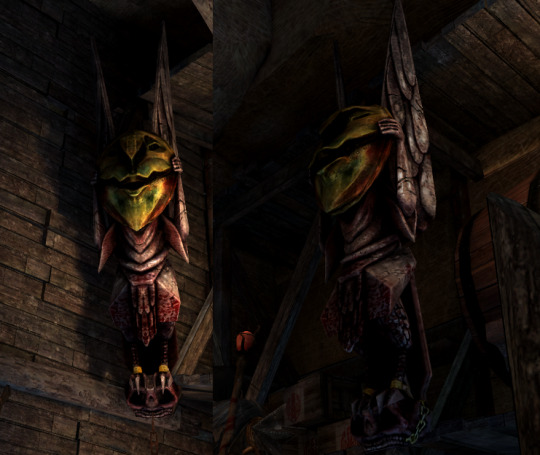
One of those is this masked bird.
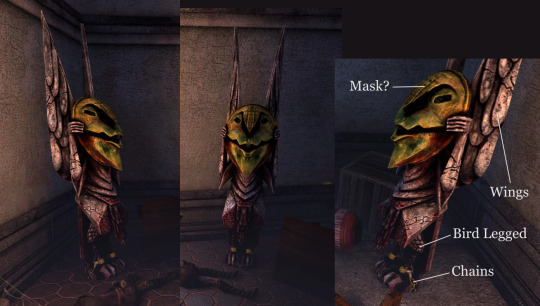
It's a strange creature: a bird-like humanoid with human hands and arms, holding a mask, so we can’t see its face. Its legs are of a bird [bent backwards], with feathers or scales [the resolution of the game is not great for these details], and it has shackles on its ankles. It also has talons and wings.
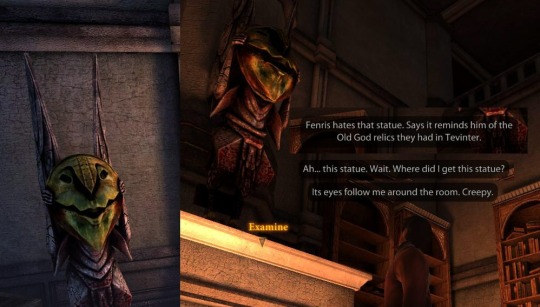
The only hint we have of any potential meaning is given when we find it inside Hawke’s mansion: we know that the statue unsettles Fenris since he claims it’s similar to relics of the old gods in Tevinter. So it’s Tevinter-made? or Elven-made and co-opted by Tevinter? who knows.
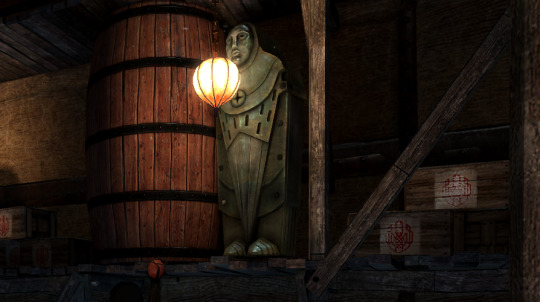
On a less interesting note, there are some iron maidens used several times in many scenarios along DA2. They have a circle on their chest with something that resembles the shape of a star. Nothing more to highlight.
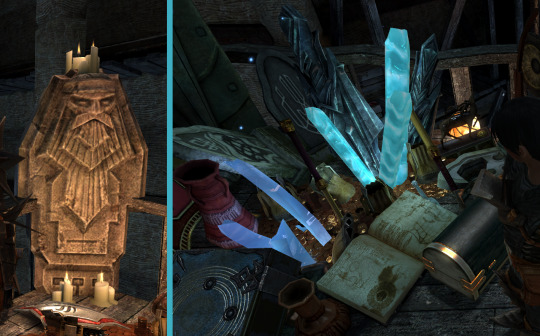
Continuing the less interesting objects: there are a lot of extra items in the emporium such as the dwarven sarcophagus we found in other quests, a lot of general stuff which is more related to fill and decorate the backgrounds than to have any lore significance, and many other objects spread along the Emporium with strange funny codex that can be found in the wiki and I don't think they require attention.
Now, what truly caught my attention in this place were 3 things:
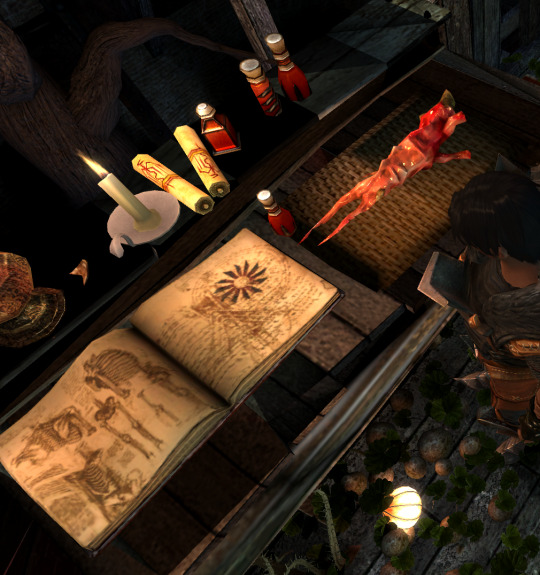
A piece of red lyrium on the desk, as a component for potions, like it's a totally normal component. After analysing DA2, and specially in the posts of the Gallows or the one about Red Lyrium, I have the suspicion that Red Lyrium m ay have been used by Tevinter when Kirkwall was still called Emerius, which would explain why Xenon has pieces of this element even when we visit him before the expedition to the Deep Roads [or maybe it’s just a dev’s overlook. It can happen].
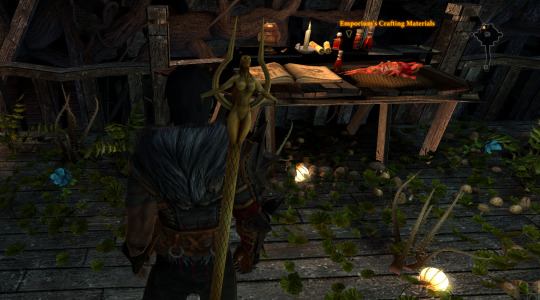
However, the detail is very well-thought: because it's red lyrium, and may have some effect on the Fade around it, we see the desk surrounded by Felandaris, an herb that only grows where the Fade is thin.
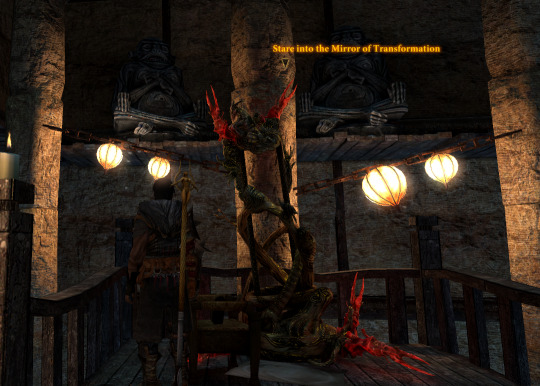
The most shocking part of this DLC, lore-wise, is that Xenon has an eluvian infected with red lyrium, being the Mirror of Transformation. Yes, it’s close to the concept that, if the Fade alterations have effects in reality, and an eluvian allows you to have access to the Fade, maybe a mirror in this twisted/corrupted condition can alter its reflection in the Fade and see the consequences in the waking world. Something along those lines. As it couldn’t get worse, in the background, on a shelf, we see two of those cursed statues [see post of Strange Idol].
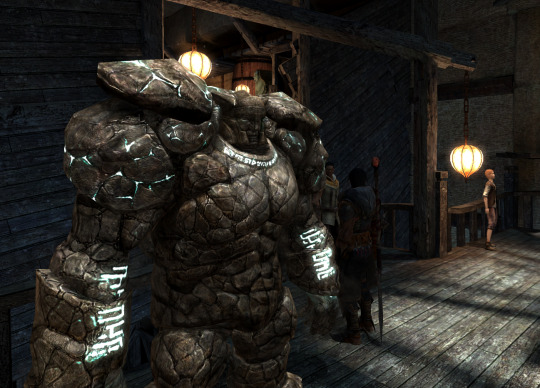
There is also a golem that, according to the emporium codex, is the defence that Xenon has when someone wants to steal something. I don’t think there is much to say about it.
Now we move on to the most interesting thing in this place: Xenon himself, the owner of the Black Emporium.
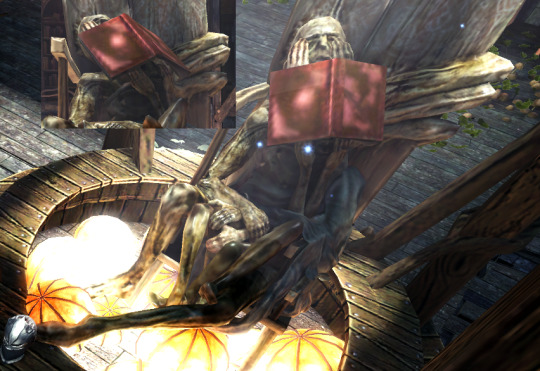
Seeing his design is fabulous. There is no way to understand what happened to him: he is a mess of limbs.
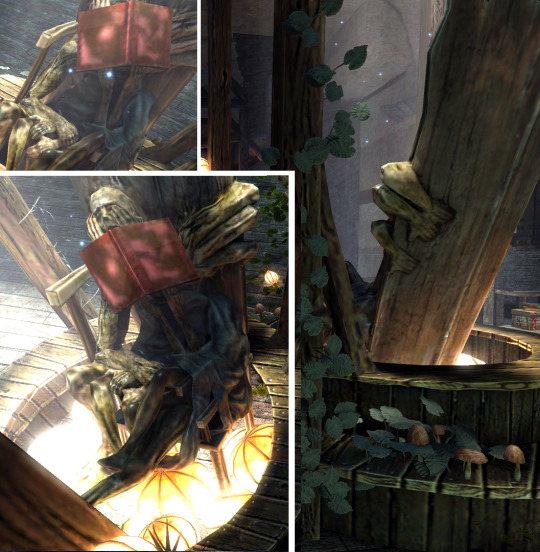
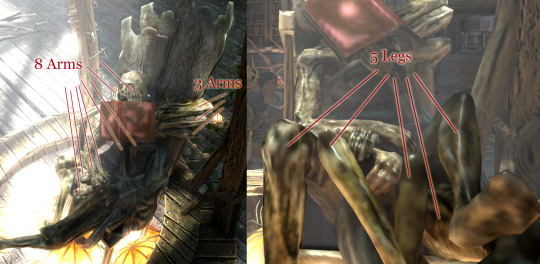
DA2 Xenon has the following characteristics: I can count 11 arms and 5 legs. Below the book there is another face, screaming, covering its eye sockets with two additional hands. It looks like small humanoid bodies were stuck or absorbed by Xenon’s core. Part of the 3 arms that reach the back of the chair are fused with the chair as well.
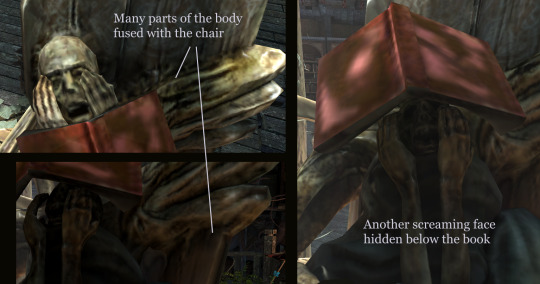
If we see the detail, his limbs are fused with the chair suggesting petrifaction?
What is curious to me was that extra head below the red book. It looks like that, in order to keep his youth, Xenon may have used magic to fuse his body with other living creatures, adding more and more limbs to his body with each procedure. Once more, this idea resembles part of the narration of The Horror of Hormak, which features monstrosities with many limbs as a consequence of fusing living creatures. As a speculation, I think there is a remote possibility that Xenon has been close to this kind of elvhenan magic, in his many experiments to seek a solution to his state.
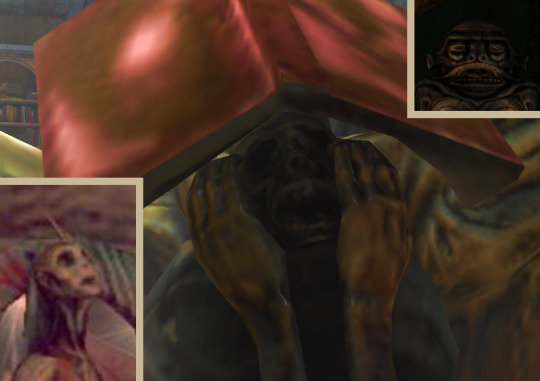
Just to discard an excess of hypothesis and wild speculation, for a moment I thought that the screaming face under the book could be similar to the cursed strange idol, or to the red lyrium idol. I placed these objects in the same picture to compare easily… and we can see there is no relationship at all. However, it’s disturbing that the small head comes from his heart, which is from where the red idol was retaken from Meredith’s remains [Tevinter Nights]. Maybe it’s not the exact same thing, but a similar procedure or the imitation of it.
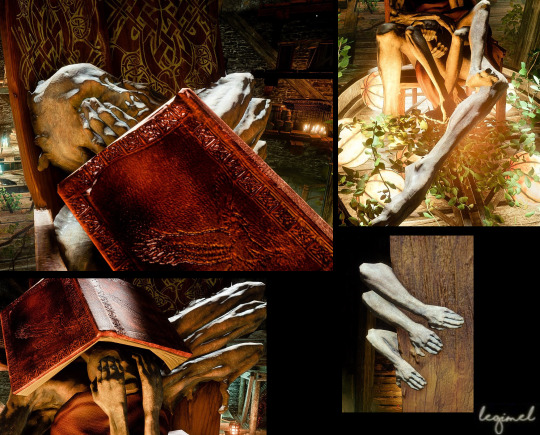
DAI Screenshots belong to https://twitter.com/Legimel
I did not replay DAI yet, but I picked some screenshots to compare and remove some doubts I was having in terms of design. DAI Xenon is not different to DA2 Xenon, the effect of his body getting fused with the chair is more notorious, as all the details are, including the small screaming head below the book. So, Xenon is consistent through both games, at a simple glance. I’ll do a detailed post of him once I replay DAI.
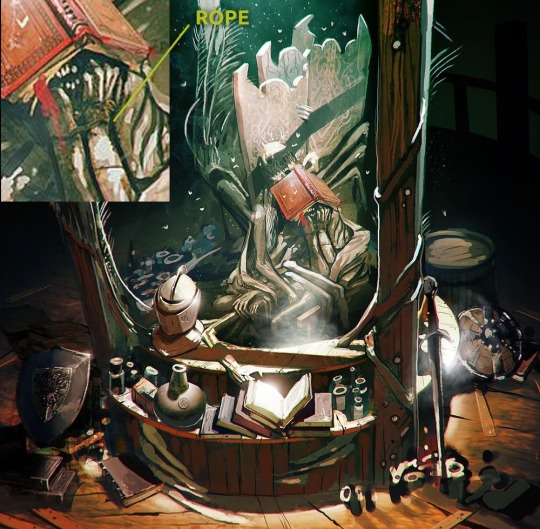
I checked the art books to see if I could find something interesting too. What I found is that Xenon’s tarot card has not much to offer with the exception of a small detail: the hands that cover the small screaming head below the book seem to be tied, giving the impression that, maybe, those bodies attached to Xenon were unwillingly people [fusing with him in an attempt to keep his youth?].
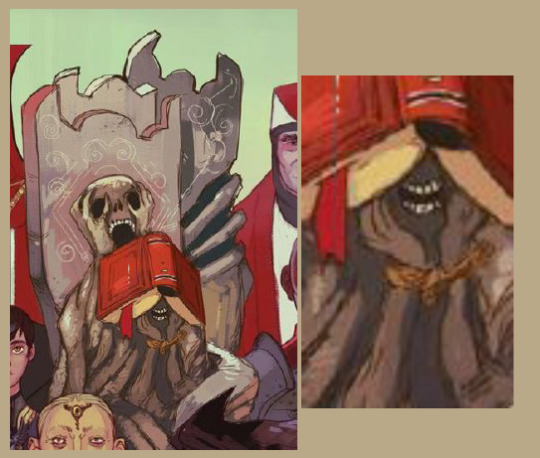
In the book Art of Inquisition, we see the same detail again: those hands are tied with a rope.
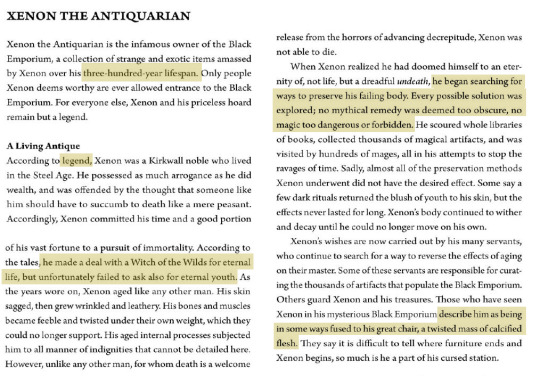
When it comes to the information in these books, there is nothing interesting. Everything is narrated in a very vague way.
The codex about him offer little important information: all of them are written by unreliable narrators that know nothing about the true past of Xenon. [Codex in DA2, and in DAI]
Like in the book of World of Thedas, there are some lines, written in a very vague way, that suggest [if this can even be considered true] that the Antivan Witch of the Wild granted him eternal life without youth. This would mean that Yavanna and her dragons [which blood is the blood of the world] may have been related to all this, but seems very unlikely. Could she be that powerful? Probably Xenon will remain a mystery forever.
[Index page of Dragon Age Lore ]
4 notes
·
View notes
Text
The real threat to the mages of Dragon Age II wasn’t Anders. Anders only turned to violence as a last-ditch effort when he was called crazy repeatedly, when mages were being abused and made Tranquil left and right and no one was listening to him about it. In fact, Anders saved the lives of every Circle mage who survived the Kirkwall Rebellion. The real threat was Knight Commander Meredith, Divine Justinia V, and Grand Cleric Elthina. Three women in positions of power who abused their power, turned a blind eye to abuse, and enabled abusers throughout the events of II.
Knight Commander Meredith Stannard
Dear lord, where do I start on her? Meredith is a mess, a literal mess of crimes against mages. She knew that Ser Alrik was guilty of trying to bring about a ‘Tranquil Solution’, which is not only unethical, but illegal. She did not provide any disciplinary action against him. Even though it’s implied that he rapes the Tranquil mages during the quest Dissent. She also did nothing when Ser Alirk illegally made Karl Thekla Tranquil, presumably to be used to bait Anders (which is also very illegal because Anders is a Gray Warden and is immune to Chantry laws against mages as a result).
Then, there’s this:
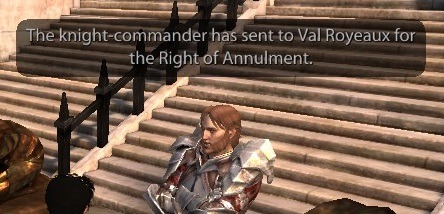
This is triggered before Anders blows up the Chantry. Meredith called for the Rite of Annulment. She called to have all of the mages of Kirkwall killed because she assumed blood mages were in the Gallows. As seen in the climax of the game, First Enchanter Orsino is nothing but cooperative with her. He tells her that she is free to search the Gallows, that he will aid her in her investigation. Normally, this should suffice. But Meredith was so paranoid and so unfit to lead the Templars that she was going to kill hundreds of innocents over hearsay.
That said, Anders’ attack on the Chantry wound up saving lives. They would have all died if action wasn’t taken.
Divine Justinia V
Justinia has some conflicting things about her that point to being both a mage supporter and anti-mage. But, given we’re discussing the events of II, The novel Asunder will be disregarded, as will any discussions of Justinia that happen within Inquisition or elsewhere.
In II, Justinia is fairly anti-mage, to the point of calling the situation in Kirkwall the worst threat to Thedas since the Exalted March, as seen in this video. If you take into consideration that most of the mage threats in II are mages rebelling against Meredith’s iron choke hold, she would actually be the threat, not the mages. And, if she was doing her job properly, she would have had one of her agents go to investigate the Gallows and the Templars after Ser Alrik sent her his Tranquil Solution; there is obviously a problem when Templars are suggesting such a plan.
Grand Cleric Elthina
This woman is also a mess. No joke. Her crime is primarily that of turning a blind eye to abuse and neglect, despite the fact that several characters come to her throughout the game and ask her to do something about Meredith’s treatment of the mages. Hawke can also step up and ask her to do something about the situation, and she refuses, stating that she is not to choose sides. Not only that, but in regards to the quest Faith (one of Sebastian’s), you can inform her of the mages conspiring to murder her, and she blames Anders for it, who, I may remind you, has only been non-violently protesting up until this point in the game.
Elthina also gave Sister Petrice a position of power, despite the fact that Petrice was guilty of trying to incite war with the Qunari. A fact that you can bring up to her and she disregards.
The point is, Elthina was in a position to do something. When several characters come to her, speaking of the abuses mages were suffering under Meredith’s command, she had it in her power to report Meredith to the Divine. And, if she was doing her job properly, she would have reported Meredith to the Divine. Picking sides isn’t insuring that innocent people aren’t being beaten, and raped, and essentially lobotomized for no real reason by the people who are supposed to be protecting them. Picking sides is, however, allowing these abuses to continue when you have the power and the standing to make it stop.
#rape tw#abuse tw#chantry critical#anti-chantry#knight commander meredith#divine justinia v#grand cleric elthina#elthina#dragon age
144 notes
·
View notes
Text
on divine justinia
Justinia V will be remembered as one of the most progressive Divines in the history of the Chantry. Before her untimely death at the Temple of Sacred Ashes, she made strides to break down barriers for both mages and elves, as well as encouraging free thought among the Maker’s many children. For her views, she won as many enemies as she did supporters.
-- World of Thedas Vol 2.
PART ONE of a series, exploring Divine Justinia’s political stance. Was she really as progressive as people claimed?
Firstly, before we even dive into any analysis, we should define the word ‘progressive’. In the most base of definitions, it implies progress -- a gradual betterment. As a widely accepted definition, someone whose politics advocate for social reform.
PART ONE - LELIANA'S SONG. / PART TWO - DRAGON AGE II. / PART THREE - THE MASKED EMPIRE.
Leliana’s Song DLC
This is where we first meet the future Divine Justinia V. We first meet her as Revered Mother Dorothea; she appears literally as a salvation to Leliana in her darkest hour, after Marjolaine has betrayed her, after Raleigh has tortured and beaten her. To make the metaphor even more glaringly obvious, we don’t even see her face at first, we hear her voice and see her as a glowing light coming down from a ceiling in a blank room. She’s clearly being painted as a ray of hope for Leliana, some sense of salvation -- (I’m very much getting the Maker helps those who helps themselves vibe from it) -- and when Leliana finally “gets” to her, she tells Leliana she’s safe.
It’s important to keep in mind that this is what Dorothea means to Leliana. This is what Leliana sees and thinks about when she’s talking to and interacting with Dorothea. To Leliana, Dorothea is hope and safety, sympathy and compassion, and ultimately, a path to salvation.
And though she may be those things to Leliana on a personal level, these traits have little impact on Dorothea's politics, which are influenced by the Grand Game and specifically how well a person can play it. This is made especially salient in the next scene.
Dorothea tells Leliana that she came to Ferelden without permission in order to fix her mistakes. The mistake she’s referring to is giving Marjolaine the papers containing Orlesian intel, which were then used to frame and implicate Leliana. It’s implied that this was the result of a seduction on Marjolaine’s part.
When Leliana questions whether Dorothea is trying to get her to steal the documents back, Dorothea denies it, just barely -- but then admits that there is “unfinished business” with Marjolaine, equating the documents she gave to Marjolaine with Leliana’s feelings of hurt and betrayal. She suggests that Leliana might want to get revenge for being “hurt so dearly” and offers to provide both Marjolaine and Raleigh’s location. She suggests that Leliana “help Orlais, and yourself”. At the same time, she claims that she doesn’t want Leliana to cause more harm to people, and yet, who was it that sends Leliana after Marjolaine in the first place? Who was it that sends Leliana to fetch the papers in the first place? With what Leliana just went through, Dorothea likely has no illusions about what Leliana is capable of -- or what she might want to do to Marjolaine, in the name of vengeance. In fact, Dorothea specifically addresses those feelings in order to convince Leliana to "help" both of them. Sending someone capable of murder -- with the motivation to kill -- after Marjolaine after tritely telling them that you don't want them to hurt more people...
Is she giving Leliana a chance do better or does she simply... not care what happens to Marjolaine as long as she gets the documents back?
This is the darkest moment of Leliana’s life. And though Dorothea shows great sympathy for Leliana’s feelings, despite her words, the actions she suggests essentially use Leliana against Marjolaine, all the while playing it off as though she doesn’t really need Leliana’s help, and this isn’t really about her at all, but it’s about Leliana’s emotions and struggles. But getting the papers back benefits Dorothea. The papers could be thrown into the sea or destroyed but Dorothea specifically pushes Leliana to retrieve them, in such a way that makes it look like that’s not what she’s asking for at all.
As Leliana, we get to quiz Dorothea and we get to see some insight into Dorothea herself. She calls the Ferelden rebellion “the Orlesian-Ferelden war” and states “Many on both sides have been reluctant to abandon the hatreds of that conflict.”
The “conflict” she’s referring to is, of course, the Orlesian occupation of Ferelden and Ferelden fighting back against that occupation. Ferelden was colonised -- I struggle to understand how the violent occupation of a nation can be equated to resisting such oppression. But, I suppose that’s typical Chantry rhetoric that we see often; we see similar commentary about any state sanctioned/Chantry sanctioned violence against elves, such as the Exalted Marches, and, later, about the mage rebellion. Dorothea does inextricably link what’s bad for Orlais to what’s bad for the Chantry; unsurprising, considering the Andrastian Chantry is used to prop up Orlesian imperialism (read here for this thought provoking meta by mllemaenaed!).
Leliana asks what happens to all the people who followed her out of the dungeon. Dorothea says that some will be turned over to the city guard, presumably of Denerim where the story is set. Dorothea does state that some of them have more than paid for their petty crimes/ The "some of them" she's referring to specifically is Silas, who wants to join the Chantry. Ah yes, the sign of true repentance... and I suppose that everyone else just isn’t sorry enough? Or being tortured and/or sexually assaulted by Raleigh and his men somehow isn’t enough to pay for petty crimes? Hmm...
Conclusions, so far:
Her politics so far don't seem to be progressive -- the implications that Marjolaine seduced her (and thus, she has an active sex life) is perhaps a bit taboo for a priest, but her politics themselves don't necessarily seem progressive at this point.
She believes those who turn to the Chantry have truly repented, but others who do not, have not. She paints the Ferelden rebellion as a two-sided conflict, rather than an acknowledgement of Orlais as a hostile colonising force in Ferelden. None of these beliefs are progressive -- they're standard beliefs of Orlais and the Orlesian Chantry.
She's aware Leliana is a criminal here, but a criminal with uses, someone she can leverage against Marjolaine -- and she does, with devastating effect. Dorothea sends Leliana after Marjolaine fully aware that it could result in Marjolaine's death -- and is either naively hopeful about the result or entirely apathetic. She plays the Game and she plays it well -- well enough to survive having sold out Orlais, well enough to manipulate Leliana into working for her for the next ten years.
This is a master of the Grand Game.
Silas: What about you? Leliana: Me? Nobody cares what I want. Silas: You should.
#my da meta#dragon age#leliana's song#divine justinia v#leliana#anti chantry#justinia critical#do i even need to tag that lmao#on divine justinia meta series
159 notes
·
View notes
Text
on divine justinia (pt 2)
Justinia V will be remembered as one of the most progressive Divines in the history of the Chantry. Before her untimely death at the Temple of Sacred Ashes, she made strides to break down barriers for both mages and elves, as well as encouraging free thought among the Maker’s many children. For her views, she won as many enemies as she did supporters.
-- World of Thedas Vol 2.
PART TWO of a series, exploring Divine Justinia’s political stance. Was she really as progressive as people claimed?
Firstly, before we even dive into looking at Justinia as a character, we should define ‘progressive’. In the most base of definitions, it implies progress -- a gradual betterment. As a widely accepted definition, someone whose politics advocate for social reform.
PART ONE - LELIANA'S SONG. / PART TWO - DRAGON AGE II. / PART THREE - THE MASKED EMPIRE.
Dragon Age II
Important things to note that are of particular relevance to the political landscape in Orlais and also the interaction between Kirkwall, Orlais and the Chantry:
Divine Beatrix III, who we meet during the events of Dawn of the Seeker, dies in 9:34, the same year that Hawke becomes Champion of Kirkwall, prompting the election of Divine Justinia V.
Divine Beatrix III nominated Revered Mother Dorothea to become the next Divine before her death.
Dorothea’s suitability as Divine was hotly debated; because of her “worldly” background and demonstrating "forgiveness to sinners" (no specific examples I can think of other than Silas and Leliana from the previous post in this series) -- not because she was hailed as progressive or a reformist.
And, indeed, based off her appearance in Leliana’s Song, we can see that, so far, there’s nothing particularly reformist or progressive about her.
The Chantry (and, by extension, Orlais) already has a history of involving themselves in Kirkwall’s politics, oftentimes outright violating Kirkwall’s right to rule themselves: in this case, specifically referring to Meredith’s rise to power in Kirkwall:
Beatrix III, known as a friend to the Emperor Florian of Orlais , pressured templars in Kirkwall to overthrow Viscount Perrin Threnhold; but Knight-Commander Guylian refused to become involved in local politics. It’s implied that the Viscount attempted to expel all templars from Kirkwall and assassinate the Knight-Commander, which may have been a set-up, but it allowed Meredith to succeed Guylian and launch a successful counter-attack against the Viscount’s Keep.
The reason Beatrix did this was because the Viscount blocked passage through the Waking Sea, exacting large fees from Orlesian ships specifically who wanted to pass.
As a result of her actions in Kirkwall, Meredith was promoted to Knight-Commander by Elthina. Meredith then appointed Marlowe Dumar as the next Viscount (not the nobility of Kirkwall) following Divine Beatrix’s advice. (Specific source unclear to me, but quoted from the DA fandom wiki page.)
Kirkwall, as of 9:37, is under Chantry rule. Marlowe Dumar is killed by the Arishok in 9:34; Act 3 begins in 9:37, and Meredith is explicitly blocking potential elections for a new Viscount specifically in order to maintain control of the city. This is established in the opening of Act 3, irrespective of whether you side with the mages or the templars.
I specify Chantry rule and not templar rule because Meredith answers to no one in the entire city -- except Grand Cleric Elthina. As Knight-Commander, Meredith answers to the Grand Cleric, who holds authority over her, as the highest ranking member of the Chantry in the region. This is an undisputed fact; Elthina has legal authority over Meredith. An argument can be made that she might not have power over Meredith, that Meredith can choose to disobey her, but that’s just not true. In fact, the exact opposite is cemented in the very opening of Act 3, when Elthina is able to get Meredith to leave Hightown with nothing more than a few words. Meredith, even at this stage where she’s “insane”, still listens to Elthina. Elthina had three years to order Meredith to allow elections for a new Viscount. She did not, which is tacit approval. Templars ultimately answer to Elthina, as she is Meredith’s superior in the Chantry hierarchy.
Ergo, Kirkwall, as of 9:37, is under Chantry rule, not merely templar rule. And considering that the Chantry is an arm of Orlesian imperialism and colonisation...
Justinia’s primary involvement in DA2 is during Sebastian’s companion quest in Act 3, part of the Exiled Prince DLC, called Faith. The quest begins with Elthina requesting for Hawke’s help.
“The Divine is concerned about the situation here. She does not want to see the Free Marches become another Imperium. She has sent an agent to ... assess the danger. Meet with her, please. Tell her drastic measures won’t be required.” -- Elthina to Hawke.
It's clear from this excerpt that the Divine is considering an Exalted March on Kirkwall as a response to the mage rebels. This interpretation is the widely popular one and there’s definitely evidence throughout the quest and even after the quest to support the idea. This is the main interpretation of this quest that I’ll focus on for this current analysis.
The important takeaway here is that, one way or another, for one reason or another, Divine Justinia V is considering calling an Exalted March on Kirkwall; she sends an agent to Kirkwall to investigate whether a March would be necessary to resolve the situation there.
A lot of the discussion between Hawke, Sebastian and Elthina about the Divine’s possible motivations in investigating Kirkwall are actually only tangentially relevant, in my opinion, because it could be partially attributed to Elthina exaggerating the danger in order to make Hawke involve themselves. However, there are three lines of dialogue from Elthina that I think are particularly pertinent to Justinia. The first one (emphasis mine):
Hawke: What argument would convince her? Elthina: The Divine has heard my protests already. I must trust your own powers of persuasion now.
This confirms that Elthina and Justinia are actively in contact with each other. Divine Justinia V ascended in 9:34, 3 years before the start of Act 3, and well before the quest. Kirkwall has been under Chantry rule for the past three years. Justinia is in contact with the single most powerful member of the Chantry in the entire Free Marches.
To be clear, this means that Justinia could have ordered Elthina or Meredith to allow the nobility to elect the next Viscount -- she could have done so in this very conversation that Elthina alludes to. She didn’t. (We know she didn't because no one has ever brought it up. Not in DA2 and not in DAI.) Nor does she through Leliana when we meet her later. She could have sent a Seeker of Truth (like, say, Cassandra) to forcibly relieve Meredith who is actively interfering in the politics of an independent nation. (She sends a Seeker of Truth to investigate whether there's really that much blood magic in Kirkwall, but not for this?) She didn’t.
That, to me, reads as tacit approval of Elthina and Meredith's actions in Kirkwall. She has no issues at all with Meredith assuming control of the city for the templars. The Chantry has had vested interests in maintaining control in Kirkwall since Divine Beatrix’s time -- this is not new. There’s no real change here from Beatrix to Justinia and there’s certainly no protest -- not even a token protest -- or investigation into Meredith’s treatment of the mages. No independent investigation, following her ascension as Divine, into the situation in Kirkwall before now.
Because it wasn’t a problem before now. Before the mages started rebelling about it -- violently. .
The problem Leliana is being sent to investigate is not whether or not Meredith is abusing mages. It's not whether or not Meredith should continue to hold power in Kirkwall. It's about how dangerous this mage rebellion is becoming.
Leliana’s dialogue later, in my opinion, confirms this:
Leliana: The Divine has long suspected that Kirkwall’s problems were being spurred by an outside group. This attack proves she is right.
The group Leliana is referring to are the Resolutionists, who are closely affiliated with the mage underground -- both mage resistance groups based in the Free Marches and operating in Kirkwall.
It’s explicit here that the problem is not the Chantry’s violation of Kirkwall’s sovereignty, it’s not that the Chantry and the Order has held the entire city under martial law for the past three years, it’s not even the blatant abuses of the Circle mages at the hands of the Kirkwall templars. It’s not even the alarming amount of blood mages or Tranquil mages in Kirkwall.
It’s a mage rebellion. That’s Kirkwall’s problem.
The next dialogue (emphasis mine):
Sebastian: She is the voice of Andraste. She cannot turn the might of the Chantry against the innocent due to ... proximity. Elthina: Were no innocents harmed in the Exalted Marches? She will do her best, Sebastian, but she must act first to defend the faith.
This is an interesting insight to Elthina’s viewpoints of Justinia. We know they’ve been in contact. Elthina is the second highest ranking member of the Chantry -- Grand Clerics are second only to the Divine in Chantry hierarchy. I sincerely doubt this is the first time she’s ever contacted her own boss in three years.
Elthina posits herself as someone pushing for peace, especially at the end of this quest when Sebastian pushes her to leave Kirkwall (despite her not really ... doing much to resolve the situation and actively refusing to do anything at all by claiming she has no power to help the situation but that’s another post). Yet, she says that Justinia’s primary motivation above all else is defending the faith. Not defending the innocent or defending the templars but specifically defending the faith.
The subjugation of mages is a central tenet of the Orlesian Chantry. It is a belief so central to Orlesian Andrastianism that the mere suggestion of Andraste being a mage or mages being allowed to exist outside of the Circle, say in Tevinter, causes a religious schism.
Elthina suggests here that Justinia will take action to defend the faith against the mages. That a mage rebellion, in essence, is an attack on the very foundations of the Orlesian Chantry and Justinia will react accordingly.
And I think she’s right to assume that of Justinia.
Leliana: Divine Justinia takes the situation here very seriously. She believes it is the worst threat to Thedas since the Qunari invaded.
The worst threat to Thedas since the Qunari invaded. The Qun, one of the most pervasive religious forces in Thedas, to rival the Chantry. The Qunari, whose invasion of Kirkwall (provoked as it was by the Chantry in the first place), enough to get the templars to take action to defend the city.
Leliana: The whole world is watching Kirkwall. If it falls to magic, none of us are safe. Tell Elthina to leave. There is refuge for her in the Grand Cathedral in Orlais. She will not be safe here.
Here, Leliana makes it very, very clear. Justinia views a mage rebellion as a threat to the faith; she will defend it as such.
Crucially, Leliana’s dialogue also sheds some light on how Justinia views the Circles.
Leliana: There have always been factions that support freedom from the Chantry and the abolition of the Circle. We have ... tolerated them. But the Resolutionists have become violent. They are likely behind the unrest here.
Even if the abolition of the Circle was an extreme stance to take, some level of freedom from the Chantry beyond what the Circle already has would be a progressive stance. Yet, Leliana presents it here as a transgression. In fact, the very beliefs of the Aequitarians -- the largest Fraternity in the College of Enchanters; Orsino himself is part of the Aequitarians, as are Wynne and Irving, who are presented as "good" mages in DA:O -- inherently wish to improve the conditions of the Circle. They seek reform by trying to comply with the ideal of a “good mage”, ones who uses their magic ethically and responsibly to help others -- but they seek reform still. This is made obvious even as early as DA:O, in conversations with Wynne. But even that moderate, and popular, view seems to be deemed as transgressive. Something to tolerate. Something to entertain but certainly not something to act on, or take seriously.
More than that, there are more Fraternities beyond just the Aequitarians and the Resolutionists who themselves are a splinter of the Libertarians. There are the Isolationists, who would abolish the Circle only to retreat further from people and keep mages separate. There are, of course, the Libertarians -- however, they don’t push for the abolishment of the Circle but rather it’s independence from the Chantry, to become a self-governing body.
Yet, Justinia merely tolerates the mages’ views of how they themselves should live their lives -- and there is an abrupt end to this tolerance, time and time again. Here, in Kirkwall. Again, in 9:38, after the events in Kirkwall, when the Chantry -- of whom Justinia is the leader of -- disbands the College and stops them from meeting at all. Mages can’t meet up even within their own Circles. And this is not done by the templars. This is done by the Chantry.
Is that really progressive? Meredith does the same in Kirkwall; she locks the mages in their cells, she inflicts harsher punishments on them such as Tranquility, and ultimately, she requests for Annulment from Justinia, expecting that Justinia will approve it. Based off the above discussions, was she wrong to assume this? I don’t think so. And there's plenty of reasons, considering the relatively recent Qunari invasion, to not grant the Right of Annulment, which have little to do with whether or not Justinia values the lives of the mages. She views a mage rebellion as bad as a Qunari invasion. The two are equivalent to her; both antagonistic forces to her goals, and the goals and beliefs of the Chantry at large.
One of the arguments I’ve seen many people use is to say that Justinia sent Leliana, who is pro-mage, to deal with the situation in Kirkwall, implying that Justinia is somewhat sympathetic to the mages, and that the Resolutionists reacted based off their own prejudices, thereby inciting any future Chantry-violence -- in a way, provoking the Chantry into reacting as they did. This is often accompanied with an ‘oh if only the Resolutionists weren’t so violent’-style commentary. It’s even lampshaded by Leliana herself: “I let word slip that an agent of the Divine was coming to investigate the mage troubles. It is how they chose to react which condemns them.“
However, talking to Elthina gets this notable dialogue:
Hawke: What can you tell me about this servant of the Divine? Elthina: I was not told her real name, only to call her Sister Nightingale. She is said to be the Divine’s left hand, sent to do the work that might blacken the Divine’s name.
Again, I delved into this already in the exploration of Dorothea in Leliana’s Song, but I thought it was important again to highlight here. Over a decade later, Justinia V is still using Leliana’s bard skills for her own gain, irrespective of her personal sympathy for Leliana. Importantly, in carrying out the Divine’s wishes and orders, Leliana can be made to act and behave counter to her own personal beliefs, something that is evidenced again later as well, when Justinia sends her to talk to Celene (which I’ve briefly discussed here). Leliana’s personal support of the mages is not indicative of Justinia also supporting the mages. If anything, sending Leliana is actually a threat more than anything; as “Sister Nightingale” is widely known as the one who does assassinations and spy work for the Divine. (On that note, I believe Aveline herself says something to the effect of how Leliana provoked them, but I can’t find any compilations on youtube that includes Aveline’s commentary.)
Conclusions so far:
Once again, Justinia's politics don't seem progressive but rather incredibly typical of Orlais and the Orlesian Chantry, and her political interests align with that of expanding the influence of the Chantry and Orlais. The templars holding Kirkwall against all legality is perfectly acceptable to her -- Meredith killing nobles to stop an election of a new Viscount is acceptable, Meredith authorising the hunt and subsequent persecution of non-mage persons under the excuse of "harbouring apostates" is acceptable, the templars killing and raping and beating and lobotomising the mages is acceptable, but what is not acceptable is when the mages fight back. That is something she considers an attack on the very foundations that the Chantry was built on -- and she will react accordingly. She sends Leliana, Sister Nightingale, the Left Hand of the Divine, well known for doing work like assassinations, to Kirkwall as a threat to the mages. She has only ever tolerated the College of Enchanters' existence. She has taken no actions to curb either Meredith or Elthina, despite having multiple opportunities and the authority to do so. She views a mage rebellion as much of a threat to Thedas as an invasion by a foreign power. What, about this, is progressive?
Sebastian: You were right. The Divine will be taking action against Kirkwall, though the sister didn’t say what.
#my da meta#dragon age#da2#divine justinia v#leliana#hawke#elthina#justinia critical#anti chantry#on divine justinia meta series
136 notes
·
View notes